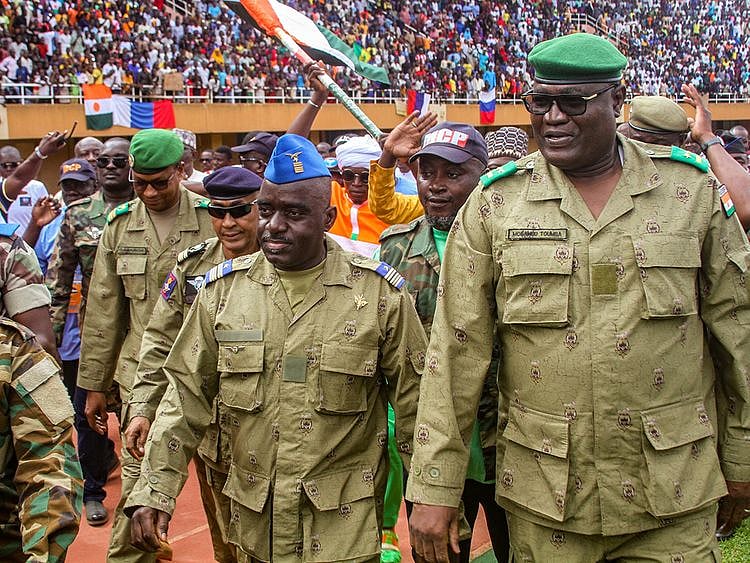The coup in Niger and its larger implications
Geopolitical shifts in Africa can directly impact the lives and futures of millions

The coup that unfolded in Niger on July 26, 2023 has thrust the nation into a state of uncertainty. Despite the coup leaders appointing Ali Mahaman Lamine, a former finance minister, as the new Prime Minister and the US Secretary of State Anthony Blinken preferring diplomacy to solve the problem, things are still very uncertain.
There is a danger that a group of countries led by Nigeria might use force to bring back deposed President Mohamed Bazoum to power, and Niger’s own military has closed its airspace, which has made the situation even more unstable.
The coup, the seventh in a string of military takeovers across West and Central Africa within the past three years, has raised a web of interconnected issues that extend far beyond Niger’s borders, posing challenges in the areas of geopolitics, economics, and security, and potentially destabilising the fragile Sahel region.
Niger’s strategic importance adds another layer of complexity to the situation. As home to substantial uranium deposits, the country plays a pivotal role in the global energy landscape, supplying 15 per cent of France’s uranium needs and contributing to 20 per cent of the EU’s stockpile.
Also Read
Military Takeover: Niger’s future hangs in the balanceBlinken says US aid to Niger in 'clear jeopardy' after military coupNiger closes airspace as deadline to reinstate president passesNiger coup tests diplomacy, Moody’s downgrades US banks, and more, Gulf News Editors comment on August 8 trending newsGrappling with economic struggles
With the change in regime, concerns have emerged about potential disruptions to uranium imports for nuclear plants in European nations. The evacuation of foreign nationals by European countries reflects the mounting apprehensions.
Despite its resource wealth, Niger grapples with economic struggles, consistently classified as one of the world’s “Heavily Indebted Poor Countries.” Its meagre GDP per capita of $533 stands in stark contrast to the global average of $12,633 in 2022.
A precarious energy situation, heavily reliant on neighbouring Nigeria for 70 per cent of its power supply, exacerbates the nation’s vulnerability to external shocks. The coup’s disruption of governance and economic activities could exacerbate this vulnerability and destabilise the entire region.
While the power struggle may have triggered the coup, its roots are officially traced to grievances over governance and the government’s response to security threats posed by extremist groups like al Qaeda and Daesh.
Regional actors, notably the Economic Community of West African States (ECOWAS), have taken decisive steps to address the crisis, suspending relations with Niger and sealing its borders to reinforce constitutional order in the region.
Nigeria, a key regional player, has even halted its power exports to Niger as part of these sanctions. While the possibility of military intervention looms, Nigeria’s Senate has advised caution. France, a former colonial power, and other regional actors’ involvement further complicates the already intricate situation.
Continentwide instability
Neighbouring nations, including Burkina Faso and Mali, warn against military intervention, interpreting such a move as aggression against themselves due to shared governance structures and historical coup attempts. Chad and Algeria also oppose any military interference.
Weak institutions, lack of checks and balances, and inadequate mechanisms for peaceful transitions of power continue to plague many African nations. Coupled with unemployment and economic inequality, these vulnerabilities create a fertile ground for military interventions.
Exploiting economic grievances and promises of security, coup leaders often capitalise on citizens’ yearnings for stability, attracting public support.
The Niger coup contributes to an alarming trend of increased military takeovers across Africa, departing from the relatively stable period of the early 2000s. This coup, orchestrated by the presidential guard, aligns with a pattern of political instability witnessed continentwide.
Despite a decline in coup attempts post-2000, recent years have seen a resurgence, spotlighting the vulnerability of democratic institutions and governance in African nations.
Also Read
Disappearance of anti-war movements raises concerns in the WestClimate Crisis: Massive floods wreak havoc in South AsiaCombating Violence: Empowering women in conflict zonesImpacting millions of lives
Niger’s close alliance with France and the USA, hosting over 2000 troops, adds an international dimension to the coup’s implications.
Africa has emerged as a battleground for geopolitical rivalries among major powers. These international power struggles, combined with colonial legacies, inflame internal conflicts and create opportunities for military interventions.
In this context, the dynamics of African coups, like the one in Niger, are increasingly influenced by global power competition within an evolving bipolar world, where unified international responses remain elusive.
While global and regional power dynamics shape the trajectory of these events, African citizens aspire to stable governance and development. Addressing the root causes of weak institutions, economic challenges, and security concerns is pivotal to reversing the surge in military takeovers.
African leaders often navigate complex terrain, juggling various international interests while addressing their citizens’ pressing needs.
As these dynamics unfold, it is imperative to recognise that the consequences of these geopolitical competitions extend far beyond political manoeuvring, directly impacting the lives and futures of millions across the continent.
Network Links
GN StoreDownload our app
© Al Nisr Publishing LLC 2026. All rights reserved.